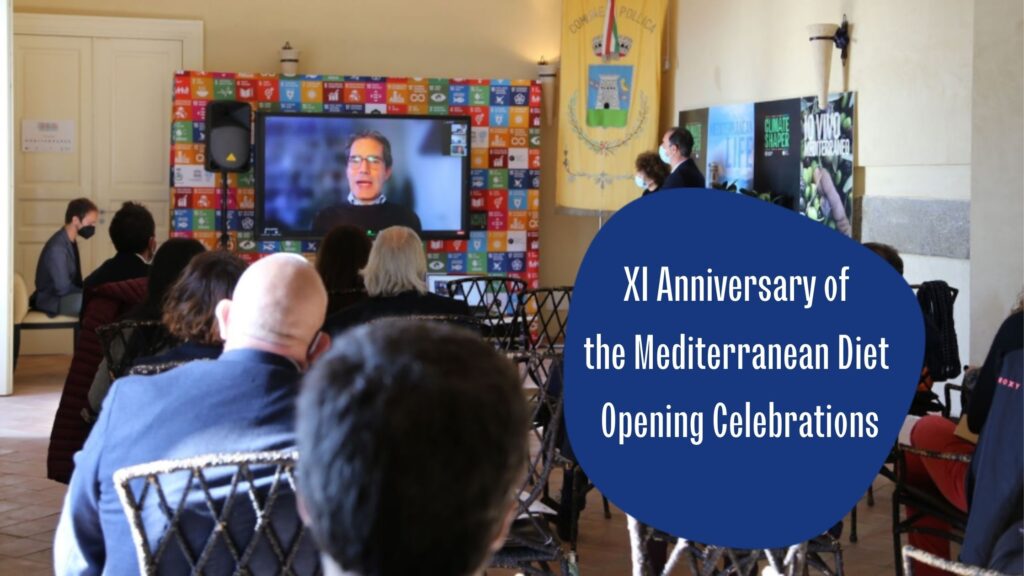Mediterranean Diet - UNESCO Intangible Heritage of Humanity
Today, 16 November 2021, we celebrate, from Pollica in Cilento, the 11th anniversary of the UNESCO nomination of the Mediterranean Diet as an Intangible Cultural Heritage of Humanity. And on this occasion, we have invited a variety of speakers to participate in this precious event.
The Mediterranean Diet is a heritage that belongs to everyone and every actor, with its unique knowledge, has an opportunity to valorize it and talk about it.
The Mediterranean Diet has both cultural and political recognition. Professor Pier Luigi Petrillo, Vice President of the World Experts Board of the UNESCO Convention on Intangible Cultural Heritage, who was present during the negotiations of this recognition says: “This candidacy marks a watershed in the international context, because UNESCO had always believed that the concept of culture was incompatible with food.”
As we know this has changed by today and also the role and perception of food is changing. Food in fact has an impact on many aspects of our daily lives.
Health Impact of Food and Diet
Food and Diet have a direct impact on our health. “Food has the power to change the composition of our microbiome present in our gut,” affirms Professor Danilo Ercolini, Director of the Department of Agriculture, University of Naples Federico II. Feeding our microbiome properly can prevent a series of illnesses. The microbiome is composed of a vast variety of bacteria, many of which actually promote health. “The Mediterranean Diet directly stimulates the creation of these specific bacteria,” explains “The Mediterranean Diet directly stimulates the creation of these specific bacteria,” explains, Foundation for Personalised Medicine.
This knowledge needs to pass from health to other fields of application like Industries, which can be inspired by the Mediterranean Diet at the food level and produce foods accordingly to it.
Environmental Impact of Food and Diet
Food and diet also directly impact the environment. Marta Antonelli, Director of Research at Barilla Center for Food and Nutrition (BCFN) and Researcher at Euro-Mediterranean Center on Climate Change (CMCC), stressed during her session today the importance of the Mediterranean Diet on the environment, evoking the double pyramid of the Barilla Center for Food and Nutrition. A sustainable diet for Humans, that helps us be healthy, is also a sustainable diet for the planet.
The areas of the Mediterranean Diet are, like Cilento and Pollica, unique examples of a biodiverse heritage that sustained through centuries. The biodiversity of this area is protected by the parks and natural reserves that exist locally.
The director of the National Park Vallo di Diano and Alburni, Romano Gregorio, also affirms: “The Mediterranean Diet is not something static but something that must be enhanced and this is the Park’s commitment. We are with you!”
Landscape Impact of Food and Diet
From the small scale to the big scale, our food and diets also impact the landscape around us. We would like to thank Ludovica Grompone, architect and engineer, Director of Mig Mamei Museum in Gioi; Martina Bosone, Researcher at the Institute for Research on Innovation and Development Services (IRISS) of the National Research Council (CNR) (online) and Angela D’Angelo, Municipal Councillor of Ascea, who actively advocate for their local territory, Pollica and its surrounding areas.
“A diet, in this case the Mediterranean Diet, also changes the land and so we can think about new forms of land governance that promote this care of the land,” they affirmed today.
From the rural area at a local level, to a wider scale, food can have an impact. This is the challenge we are taking together with UNIDO ITPO, with Andrea Carapellese, Investment Promotion Expert at UNIDO ITPO, to build resilient food systems in different parts of the world.
Celebrating the Mediterranean Diet
Celebrating the Mediterranean Diet today, means not only remembering an important success, but it means starting from this heritage to build a better future.
“The problem with recognitions is that they often tend to crystallize reality and are not the end point of the discourse, but rather the starting point. It means that you as a community have a huge responsibility, to disseminate and explain to the younger generations and governments that the way of life that characterizes the Mediterranean dispute is sustainable and affects conviviality, presupposes diversity.” – Prof. Pier Luigi Petrillo, Vice President of the World Experts Board of the Unesco Convention on Intangible Cultural Heritage.

